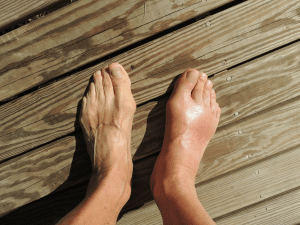 Gout is a painful condition that commonly develops in people who have high levels of uric acid, also known as urate, in their blood. This condition is known as hyperuricemia, and only about a third of the population affected by hyperuricemia develop gout. The disease affects joints throughout the body, where urate crystals form. The symptoms of the disease result from the body’s inflammatory response to these crystals. Urate crystals can also form in the kidney or other parts of the urinary tract, and may sometimes impair the function of the kidneys. An estimated 15 percent of patients with gout have kidney stones as a result of hyperuricemia. Gout carries almost twice the risk of kidney stones when compared to the incidence of kidney stones in those people who are not affected by it.
Gout is a painful condition that commonly develops in people who have high levels of uric acid, also known as urate, in their blood. This condition is known as hyperuricemia, and only about a third of the population affected by hyperuricemia develop gout. The disease affects joints throughout the body, where urate crystals form. The symptoms of the disease result from the body’s inflammatory response to these crystals. Urate crystals can also form in the kidney or other parts of the urinary tract, and may sometimes impair the function of the kidneys. An estimated 15 percent of patients with gout have kidney stones as a result of hyperuricemia. Gout carries almost twice the risk of kidney stones when compared to the incidence of kidney stones in those people who are not affected by it.
Gout rarely develops before adulthood, and is often seen in men who are between the ages of 30 to 45 years. Women who are affected by it tend to develop the condition after the age of 55, and it is most commonly seen in people who are older than 65 years of age. Gout may affect as many as 4 percent of American adults.
When Gout Attacks
A gout attack refers to a sudden onset of severe joint pain that is usually seen in combination with swelling, tenderness and redness of a joint. It typically affects one joint at a time, although several joints may be affected. The natural course of gout is resolution within days to weeks, after pain reaches its peak within 12 to 24 hours from onset of the attack.
Healthcare providers who see patients in the midst of a gout attack, also known as a “flare,” are most concerned with relief of the symptoms. The diagnosis is best made by examination of the fluid from the affected joint. Under a microscope, urate crystals will be visible. The fluid is obtained using a needle and syringe. Gout can be strongly suspected and treated in patients who have pain and inflammation that involves a single joint, particularly the first joint of the large toe, followed by a period of complete resolution of symptoms.
If you are experiencing painful gout flares, you should seek the advice of a qualified healthcare provider. Dr. Brendon McConnell and Dr. Nelson Keller are experienced in the effective treatment of this often debilitating disease, and they are able to advise their patients of preventive measures that will significantly reduce the frequency of attacks.
If you are suffering from a painful joint,contact us today, as relief and prevention will allow you to resume your enjoyment of life.






